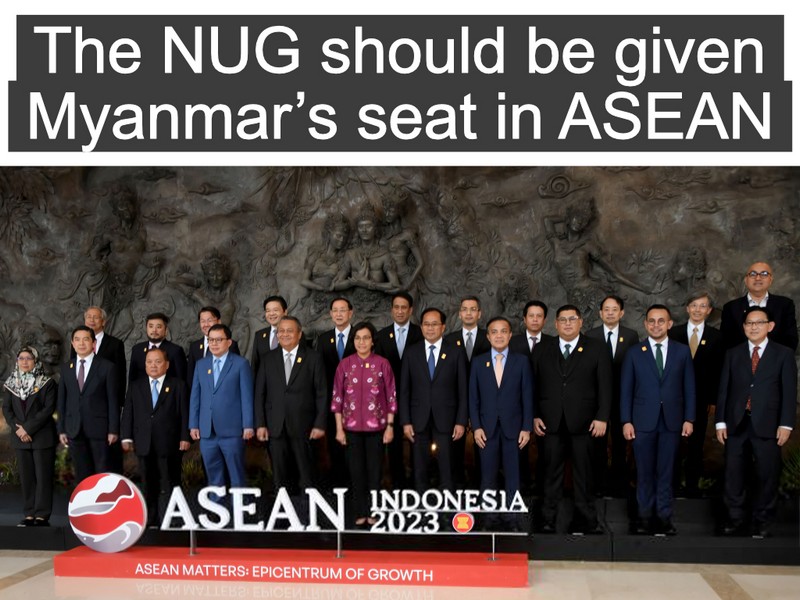Under the chairmanship of Indonesian President Joko Widodo, the 42nd Association of Southeast Asian Nations (ASEAN) Summit commenced today. When Indonesia accepted the chairmanship from its predecessor Cambodia five months ago, there was renewed hope that ASEAN would take a harder line against Myanmar’s military junta in 2023. With only eight months left before the ASEAN chairmanship is handed to Laos, ASEAN’s emphasis remains on implementing its failed Five Point Consensus, engaging in an “inclusive national dialogue,” and facilitating the repatriation of refugees back to Rakhine State, against repeated calls from Myanmar civil society to change its course. As ASEAN drags its feet, Myanmar continues to burn.
For two years, the people of Burma have bravely resisted the junta’s violent attempt to take total control of the country. In the face of mass, unwavering public resistance, the junta has continued to increase its campaign of brutality and savagery as it carries out killings, torture, forced disappearances, sexual violence, and daily airstrikes against the civilian population throughout the country. Last month, a junta fighter jet dropped bombs on approximately 300 people in a village in Kanbalu Township of the Sagaing Region, killing at least 168 people according to the National Unity Government (NUG). Currently, the number of casualties is nearing 3,500 and still rising.
Despite ongoing atrocities, ASEAN’s response has remained limited to symbolic actions, like banning Burma from meetings. Burma was banned from annual ASEAN summits when Brunei held the chair in 2021 and again by Cambodia last year. However, ASEAN continues to normalize engagement with the junta by treating it as a reliable authority despite it having no legitimacy to represent the will of the people of Myanmar nor the ability to seize effective control of the country. A September 2022 briefing paper by the Special Advisory Council for Myanmar and maps recently produced by the Free Burma Rangers show that the junta does not have sufficient effective control of the country to warrant engagement with ASEAN and other international actors.
“ASEAN cannot expect to negotiate with an oppressive regime holding the country hostage,” said Burma Human Rights Network (BHRN) Executive Director, Kyaw Win. “The source of all of Myanmar’s most significant problems is the military. The regime only manages to survive because the world has taken a soft stance against them after each crime against humanity. This cannot continue, and ASEAN has particular influence to deny them any semblance of legitimacy.
With less than eight months remaining as chair, pressure is mounting on Indonesia to take concrete measures to end the crisis in Myanmar and to hold the junta accountable for its atrocities. As one of the largest democracies in the world with experience toppling its own dictatorship, Indonesia has the opportunity to do what its predecessors could not – to provide the help that the Myanmar people so badly need in their struggle for democracy.
To start, Indonesia should publicly acknowledge the NUG as the legitimate government of Myanmar, and engage with it, alongside representatives of Ethnic Resistance Organisations (EROs) and Myanmar civil society, on all issues. The NUG should be given Myanmar’s seat in ASEAN.
Indonesia should promote within ASEAN a new agreement to replace the failed Five Point Consensus, an agreement signed by ASEAN member states and Min Aung Hlaing’s junta in April 2021 which aimed to end the violence in Burma, foster negotiations between all stakeholders, and deliver humanitarian aid. Min Aung Hlaing has openly flouted ASEAN’s peace plan from the outset. ASEAN must recognize the futility of seeking a negotiated solution to Myanmar’s crisis that could be palatable to the exiled NUG, EROs, and the junta. Moving forward, a new agreement should be negotiated with the NUG and allied forces, not with Min Aung Hlaing, and it should include clear benchmarks and enforcement mechanisms.
Indonesia should immediately announce the appointment and establish a clear mandate for the ASEAN Special Envoy for Myanmar grounded in human rights, justice, and accountability. The envoy should be accountable to ASEAN leaders and foreign ministers instead of the incumbent ASEAN Chair. Once appointed, the envoy should open formal communications and engage with the NUG, National Unity Consultative Council, the Committee Representing Pyidaungsu Hluttaw, EROs, civil society, and other critical stakeholders from Myanmar’s Spring Revolution.
Indonesia should guide ASEAN to re-strategize its humanitarian support plan by working through the NUG, ethnic organizations, and Myanmar’s vibrant civil society to assist those affected by the humanitarian crisis. Currently, the junta continues to be represented in the Governing Board of the ASEAN Coordinating Centre for Humanitarian Assistance on disaster management.
As the main driver of the humanitarian crisis in Myanmar and an actor that routinely weaponizes humanitarian aid, the junta cannot and should not be trusted to deliver aid in an effective mannersaid
said Kyaw Win
BHRN calls on Indonesia’s leadership to work with governments worldwide to freeze all ties with the junta, impose travel bans, global sanctions on military-owned companies, and an arms embargo. ASEAN should also take a leading role in making the junta accountable for its horrific crimes. Finally, ASEAN should put the safety and security of those fleeing the conflict and ongoing atrocities in Myanmar by providing protection, support, and humanitarian and legal aid to all refugees fleeing Myanmar.
Organisation’s Background
BHRN is based in London and operates across Burma/Myanmar working for human rights, minority rights and religious freedom in the country. BHRN has played a crucial role in advocating for human rights and religious freedom with politicians and world leaders.
10 May 2023
Media Enquiries
Please contact:
Kyaw Win
Executive Director
Burma Human Rights Network (BHRN)
E: kyawwin@bhrn.org.uk
T: +44(0) 740 345 2378

